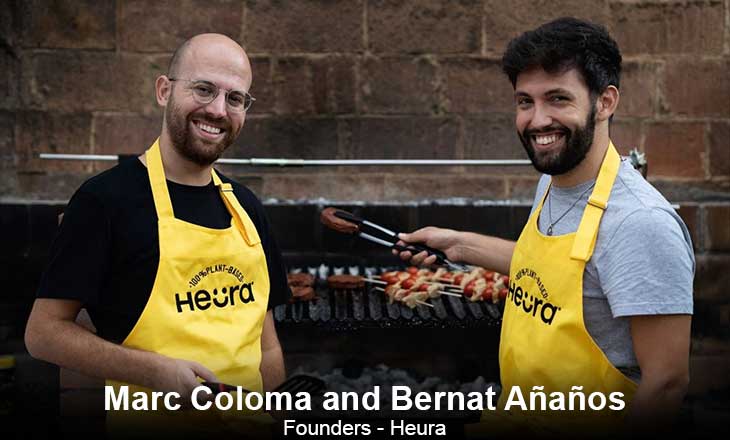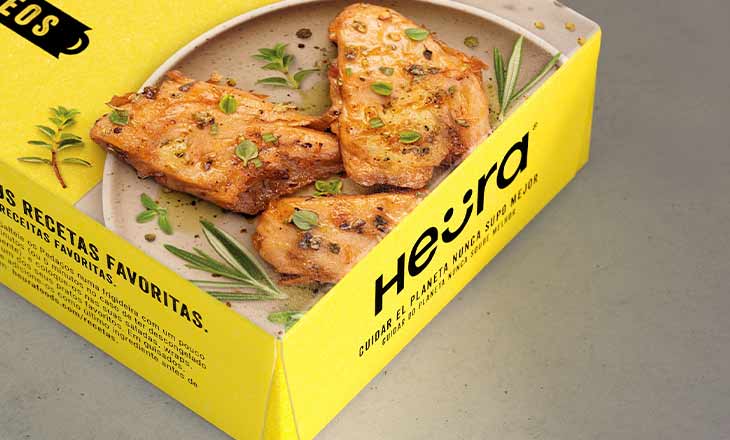Heura secures $20 million in funding for its plant-based proteins in anticipation of a larger B round the following year
- ByStartupStory | October 25, 2022

What’s up with the increase in demand for vegan meat? The situation appears promising if you look at Barcelona-based Heura, an alternative protein firm that claims “non-stop” momentum and a nearly doubling of income from sales of its fake chicken, beef, and hog products in the first half of 2022.
The startup, which was founded in 2017, reports that, as of mid-year, its revenue had increased to €14.7 million from €7.6 million at the same time last year. This is the result of the company having its most successful first half of the year in its five-year history and securing the stocking of several major retailers with its plant-based foods. This year, more “significant” relationships with European shops are expected, and “triple digit growth” of more than 100% YoY is claimed.
It has also achieved some visible success in its home market by convincing restaurant owners to include its products (and brand name) as plant-based ingredients on their menus. This enables them to provide vegan substitutes for meat dishes, such as tacos and bocadillos as well as curries, poke bowls, and other dishes. Additionally, Heura claims to be responsible for 80% of the local plant-based category growth (although it should be remembered that Spain continues to be one of Europe’s top consumers of meat derived from animals, thus the growth of alternative proteins is beginning from a low base). As it intensifies its efforts to develop in Europe, it adds that it anticipates finishing the year with a 30% local market share.
It’s also hinting at a Series B round that it hopes would be one of the biggest in Europe for alternative proteins in 2023 (for comparison, another European business, Planted, raised a $72M Series B financing earlier this fall). And today, instead of the anticipated (beefier) B, it is announcing a fresh €20M bridging capital round. It points out that this (pre-) Series B funding involves the issuance of convertible notes that will convert to stock in the main Series B round the following year, demonstrating the unambiguous buy-in of investors to the company’s sales growth proposition.
According to Heura, the bridge round also features investments from Unovis Capital, football players Sergi Busquets and Sergi Roberto, NBA star Ricky Rubio, and comedian David Broncano. A portion of the money was raised earlier this year through the crowdfunding campaign Equity for Good Rebels, which amassed more than €4M in 12 hours and attracted more than 5,000 individual backers.
With an eye on expanding in important markets like France, Italy, and the UK as well as new European territories like Austria, Germany, Switzerland, the Netherlands, and more over the coming years, the round will aid it as it continues to scale in the area.According to a press release from Heura, “With new capital in hand, a main emphasis for Heura will be positioning itself as the European plant-based leader by 2027.”
Following the submission of its first patents in November 2022, new items in “new segments” are definitely on its 2023 menu, though it’s unclear exactly what it’s cooking up. According to its PR, its main goal for the upcoming year is to create new dishes that are “nature-positive, nutrient-dense, and attain culinary excellence.”
We’re not just looking to make foods that replicate animal meats, Heuro CEO and co-founder Marc Coloma said when asked about what’s next. Instead, we are attempting to develop “meat successors” for animals, which are delectable foods that are superior from the perspectives of sustainability and nutritional value. In order to unlock better food options utilising straightforward, low-energy methods, we are concentrating on developing a new technological platform that takes advantage of inherent plant qualities. And we will submit our first patent applications next month.
In addition, he said, “We recently established Good Rebel Tech, which is focused on a new approach to food technology that will generate macro- and micro-nutrient dense meals in a nutrient-dense, net positive manner that goes beyond what’s been technologically achievable to-date. So far, if we may use that phrase, it sounds quite good. However, following initial intense enthusiasm, the plant-based meat category has been somewhat deflating recently.
Which may help to explain why Heura is making a big deal out of this bridging round and hinting that greater money is on the way next year. The continuation of momentum is not always guaranteed. For instance, US juggernaut Beyond Meat said earlier this month that it was cutting its personnel by almost a fifth, citing dwindling sales.
Bloomberg reported on the plant-based category’s cooling demand last month, citing a Deloitte report that suggested that “stagnating” demand may be due to a number of factors, including the addressable market being smaller than initially thought (including as a result of “cultural resistance,” which may be linked to the rise in political polarisation across many societies); inflation (and high food price inflation in particular) eroding consumers’ willingness to pay a premium; and so on.
Some of these ideas might suggest that the meat lobby has been successful in its efforts to stop the kind of comprehensive change of the food system that is essential if humanity is to reduce carbon emissions in accordance with climate goals.
The meat industry, for instance, has been spending a lot of money on advertising efforts that portray plant-based foods as “frankenfoods” while portraying animal-based meat as an easy, straightforward, and (relatively) healthful choice. Such as this US attack ad campaign, which disparages plant-based proteins by suggesting the products are much more processed and full of scary-sounding chemicals than the equivalent meat products (with absolutely no mention of health issues attached to consumption of meat products like bacon, such as the risk of a number of cancers the WHO has linked to consumption of red meats and processed meats for years); while running all these self-interested claims under an alarmist tone.
To combat these cynical attack strategies, plant-based firms will probably need to step up their communications and product development efforts (and, ideally, raise the curtain on production techniques, as some already have).
To introduce full cuts of vegan chicken to the menu in Europe, Planted receives $72 million. Startups that are founded on plants are at least in a position to enlist the aid of (broader) environmental campaign organisations and movements to boost their own pro-climate messaging.

Heura’s PR characterises its development possibilities at this stage in the PBP (plant-based protein) hype cycle as “clear communications of the benefits of the protein transition paired with bringing more people together to vote with their fork will help lead the way in our growth across the continent.”
There is undoubtedly a compelling narrative PBP brands can use to persuade people who are worried about the environment to buy their meat alternatives.
Heura alone, for example, can claim that in the first half of this year, it saved 509,000 chicken, pig, and cow lives in addition to saving 3.6 million kg of CO2 and about 55.9 million gallons of water. Because of this, anticipate louder counter-messaging from more alternative protein businesses in response to tobacco-style attack marketing strategies used by the meat lobby.
Our ability to operate in a special intersection of being nutrient-dense and net positive, while simultaneously working hard to raise consciousness and produce an incredible gastronomic experience, gives us a distinct competitive advantage, claims Coloma.
“We are also lucky to have been able to build a passionate online and offline community of Good Rebels who firmly support our cause.
“We put a lot of emphasis on open communication about the advantages of a plant-based diet, and people have reacted positively to that. In a similar vein, we give top priority to producing meals that let people continue their beloved culinary customs. As an illustration, we recently introduced a new Breaded Chicken Fillet. Research has shown that this retail category has a 20% market share. We have the chance to expand our audience by introducing a cuisine that we know people would appreciate in a method that is healthier for the environment, people, and animals.
While noting what it claims has been a rapid growth in VC investments and major consumer brands into the category over the past year, Deloitte’s report advises plant-based/alt-meat producers to “explore ways to expand the addressable market, bring down relative costs, and create formulations that provide health benefits while maintaining taste” to stoke growth (and suggesting that resulting innovations may pave a smoother growth path for the market).
While plant-based proteins still frequently cost more than meat (not least because of the extent of subsidies supporting conventional food production methods), which is unquestionably a concern given rising food inflation (and the cost of living crisis), the scales may be shifting. Particularly in Europe, where the continent continues to be severely vulnerable to high energy costs brought on by Russia’s involvement in the Ukraine conflict and its reaction to Western sanctions as the EU works to lessen its reliance on Russian gas imports.
Bottom line: Since generating protein for human consumption is much less efficient than raising animals for slaughter—flesh and blood creatures that of course need to be fed proteins themselves—high energy costs tend to affect the price of meat more than plant-based food production. Therefore, if plant proteins are fed directly to people, a very expensive step is avoided.
This dynamic suggests that the price difference between meat derived from animals and (at least some) plant-based proteins should continue to narrow, especially as startups like Heura continue to proliferate and grow, allowing them to achieve greater economies of scale in their production facilities.
We’ll have to wait and see how much of the PBP business’s “stagnation” is caused by unscrupulous attacks from the meat industry and self-hype over worse climate realities.
Coloma was bullish in her assessment of Heura’s chances for expansion, writing in a statement: “Having mission-driven investors on board who dare to take bold action to accelerate the shift to plant-based proteins provides us the resources to continue driving category growth across Europe. We have a clear vision, and this additional capital will assist us in changing from a successful Spanish plant-based business to a food-tech firm that is driving the European Union’s transformation to lean proteins. The goal of this growth route is to put us in a position to close the largest Series B rounds in the industry by 2023 and usher in a better future.
He does, however, offer a warning that the price premium issue is likely to persist, at least until policymakers adopt a more accommodating stance toward the industry.
The price parity with animal foods is one of our primary areas of concentration. Unfortunately, there are still a lot of political reforms that need to be made before entrepreneurs can choose a fully sustainable system. In many cases, it is because of these reforms that sustainability and affordability are not “at odds,” the author claims. Governments have a crucial role in backing greener businesses, from how subsidies are distributed to the messages that are broadcast in the media. We want to supply net-positive products at prices comparable to their meat analogues with Heura. We still have a ways to go.
According to Coloma, the retail industry is presently the major channel driving sales of Heura’s products, with supermarkets serving as the “central driver” and being followed by hypermarkets. As plant-based solutions continue to be widely available in the dining scene, he continues, “we are also witnessing a steady increase in the food service industry.”
According to Coloma, Heura’s clients are still “mostly flexitarian” and “put sustainability and health at the centre of their consumption patterns,” and the company’s most popular items are still its chicken parts, followed by its burger and mince meat.
According to him, “environmental impact is top of the consumer’s mind” and that “[just] in the UK, 49% of adults are even more likely to prefer buying environmentally sustainable products that care for materials and origins,” he further asserts that “consumers are now more than ever looking to adopt brands that embrace eco-friendly practises throughout their entire value chain.”
Although Heura already has a presence in more than 20 countries (including sections of Asia, South America, and North America), Coloma claims that for the time being, expansion in Europe is still its main priority. The expansion of the plant-based category across Europe is our present priority. In addition to the UK, Italy, and France, where we recently began, we have recently expanded into Germany, Austria, and the Netherlands. Having said that, we will maintain a global attitude as we expand over the ensuing years.









